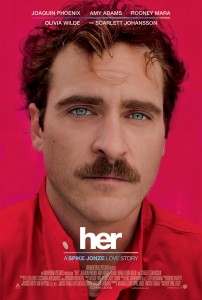Her: Relationships and Reality – Review by Zach Walker
 Written and Directed by: Spike Jonze
Written and Directed by: Spike Jonze
The first time I saw a trailer for Her, I immediately thought, “That’s not going to work.” I admit I can be a judgmental person, especially true when it comes judging a movie based on the trailer. So, when good reviews started pouring in (although I make snap judgments about movies based on trailers, I also consider myself immediately wrong in the face of a positive Rotten Tomatoes rating). I was contrite enough to think, “Well, if the premise is a little out there but the reviews are so positive, then they must have made it work… maybe I should check it out.”
Turns out Rotten Tomatoes was right. This movie is well done and it stuck with me.
Why did it stick with me? Because I’m in a relationship. I’ve been in relationships. And because sometimes relationships are complex and have stages of self-doubt and discovery, and risk (particularly as you invite friends to see you in the relationship and meet the other person, and you reveal more of yourself to the other person). Relationships demand our vulnerability.
Let’s talk about relationships. But first a brief synopsis. (If you’ve already seen the film, feel free to skip ahead.)
The first few minutes of the film set up Theodore (Joaquin Phoenix) as a lonely guy going through a rough time in his life. He is separated from his wife and leads a life bereft of meaningful connections – attempts at reaching out to people are polite (his interactions with the guy at the front desk at work) or downright awkward and removed (his attempt at sexual intimacy with a stranger over the phone). Given that lack of personal connections in his life, Theodore’s profession is particularly poignant: he works for a company people hire to write meaningful letters to loved ones. And Theodore is good at it; he is good at writing – creating – deep, meaningful communication – just not so much with real, live people in his own life.
Then he buys a new operating system – a brand new intuitive operating system. Imagine if Siri could think and had some psychological processing capability (when installing the system the computer asks Theodore to describe his relationship with his mother). Theodore and his new operating system, Samantha (voiced by Scarlett Johansson), hit it off and begin dating. Yes, she’s a computer – go with it for now – and relationship ensues.
That’s the question that echoes over and over again in this film. I think it strikes a chord because we are thick with relationship talk in our culture right now. In an age when I’m more likely to chat online with someone in Poland while playing World of Warcraft than I am to speak to my actual neighbor, what marks or distinguishes a “real” relationship? How important is physicality? What does it mean to share life with another person? In a world where telecommunication arguably makes long distance relationships easier, what does it mean to be someone else’s significant other from a distance?
I’ve dated people long distance and I have to admit Theodore and Samantha’s relationship isn’t too different from that. And if I’m honest, Theodore and his operating system do a lot better communicating in their relationship – both qualitatively and quantitatively – than I did in some of those relationships. All those married people I know say the most important thing in a relationship is communication, communication, communication.
So they can communicate; but is Samantha real? I’m going to argue that she is. Theodore isn’t imagining his interactions with her. She is not coerced into the relationship.[1] The responses aren’t pre-programmed.[2] Their relationship is most analogous to a long distance relationship without the possibility of meeting in person. And if that is enough for them, then who am I to say it isn’t?
What Is Enough? Am I Enough?
The film also grapples with the question, Am I enough? Both Samantha and Theodore struggle with this. Samantha’s struggle is around the very issue mentioned above: she isn’t physically present in Theodore’s life. It is an extreme take on the body issue, common in a lot of relationships, where one or both persons wonder whether his/her body is enough – handsome enough, hot enough, sexy enough, desirable enough – for the other person? We are exposed to ‘perfect’ bodies in so many different media outlets, that we are intimately familiar with the question of “enough”. We are given a steady stream of messages aimed at making us look at ourselves with increasing dissatisfaction (women are not the only target with this anymore, although I do think women still bear the majority of the attacks); when was the last time you saw a magazine that made you feel good about your body, or that had a tag line on the cover that read, Why you should feel great about the body you already have and the person you already are?
Theodore’s foray into insecurity comes after signing his divorce papers, when his now ex-wife claims he is incapable of handling real emotions. It sends Theodore into a spiral, questioning his relationship with Samantha and how real it is, wondering if Samantha is capable of real emotions and what that might say about him. The emotional side of relationships is one that will always, at some point, make you feel like you are out of your depth, and it isn’t long before you ask yourself if you are really enough for the other person. Some wise person once told me that relationships are a delicate balance: you should feel lucky to have them, and you should feel they are lucky to have you. If you tip too far into one of those without balancing them, you are heading for trouble.[3]
Insert Faith (Here)
All of these have parallels in faith. I want to be careful here; I don’t think Spike Jonze intends this movie to be an elaborate faith metaphor, but I do think it speaks to faith. Faith, I believe, is not a list of rules but a relationship. That relationship comes, at various points, with issues that mark any relationship.
What does a real relationship (with Christ) look like?
Jesus isn’t physically present in my life (not in the way I would say my friend Kevin, who is sitting across from me in this coffee shop, is physically present). And yet we Christians point to Christ as one of the most important, if not the most important, relationship in our lives. In a world where it is increasingly easy to see and read about others’ relationships with Christ, how do I compare (or, gasp, judge) my own relationship with Christ?
Am I enough (for God)? Is God enough for me?
It is natural to wonder, at times, if we are enough for God. That question creeps up on me when I screw up with something I thought I didn’t have an issue with any more. Or I wonder how many things I don’t know I’m doing that fall short of God’s Kingdom. And while you can tell me that is the point of grace, and that is true, it doesn’t silence the insecurities.
And let’s not ignore the dark moments when I wonder if God is enough. Would I prefer a God that communicated more clearly? Do I wish God showed me more favoritism? Those kinds of questions equate to doubt (which is at the center of wondering if God is enough) but doubt is part of faith, too.
Am I capable of having a relationship with God; how real is my relationship?
So we wind up back at the beginning: am I really capable of having a relationship with God? Are my emotions complex enough? Is faith, which is hard to describe to others and ultimately something others can smile or frown upon, is this faith real?
We have to decide if we think faith – the relationship – is worth it. We have to decide if we trust it. We have to decide if we trust ourselves and the person on the other end of the relationship.
Maybe that’s the point.
Zach Walker is pastor of youth ministries at Village Presbyterian Church in Prairie Village, Kansas. He enjoys ice cream and is not currently in a relationship with his operating system.
[1] I have to note that Theodore buys the Operating System, thus meeting Samantha. But I don’t think he owns Samantha. Samantha is not forced to interact with Theodore romantically, and the film’s ending makes it pretty clear that Samantha isn’t in servitude.
[2] Although another great conversation is to talk about what in us is pre-programmed versus what is spontaneous, or freewill. So to what degree is Samantha a combination of nature and nurture just like we are? Feel free to blog about it.
[3] Tip too far on “they are lucky to have you”, and everything they ever ask of you is a burden. Tip too far on “you are lucky to have them”, and you allow them to walk all over you without having to respect and care for you.


